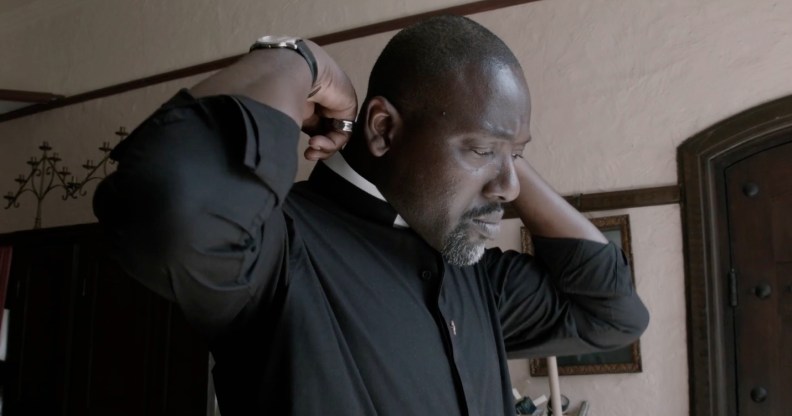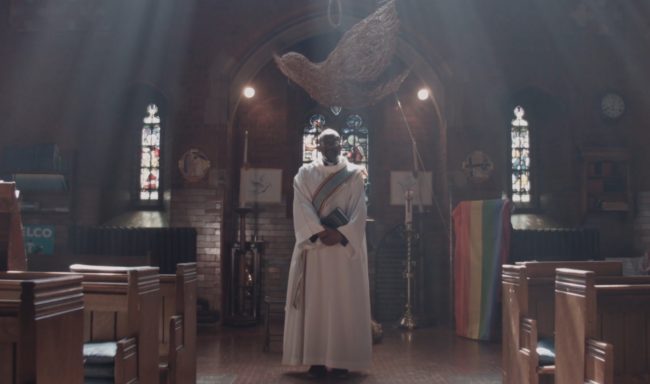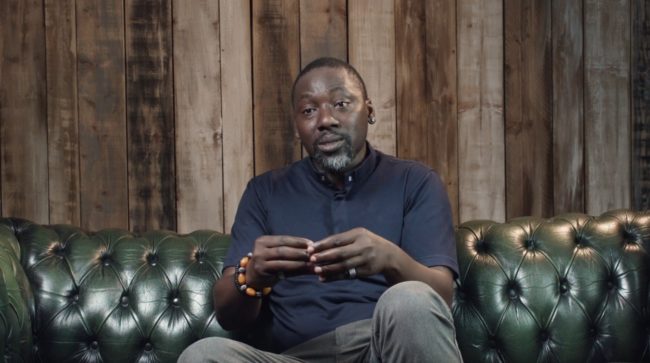Gay priest Jide Macaulay: ‘Gay simply means God adores you’

Openly gay priest Reverend Jide Macaulay features in Stonewall’s BAME Voices documentary.
Openly gay priest Reverend Jide Macaulay has invited people who have an issue with LGBT+ people to confront God about it.
“Those who argue against the sexuality of the LGBT community actually need to take it up with God because I have taken it up with God and I have reconciled,” the openly gay priest of Nigerian descent says.
Macaulay features in a documentary exploring the difficulties and achievements of the black, Asian and minority ethnic (BAME) LGBT+ people currently available for viewing on YouTube.
-

Openly gay priest Reverend Jide Macaulay says he was ostracised by the religious community for being gay. (Stonewall)
Produced by LGBT+ rights group Stonewall in partnership with filmmaker Cherish Oteka, an alumni of Stonewall’s BAME/POC LGBTQ Role Models programme, the BAME Voices documentary is made up of six short videos tackling various themes.
Gay priest founded Nigeria’s first place of worship for LGBT+ people
Macaulay’s experience features predominantly in the video about religion. The priest founded House of Rainbow Fellowship, Nigeria’s first place of worship for LGBT+ people, 12 years ago after finally reconciling both his faith and his sexuality.
“I have been ostracised, I have been demonised, there has been an attempt to exorcise me. I determined to pray to God for 40 days and 40 nights,” he says in the video.
“I came to understand it is possible for me to suppress my same-sex feelings but it is not possible for me to get rid of my same-sex attraction.”
“Intersectionality is too often left out of the conversation on LGBT+ equality.”
— Cherish Oteka
Like others interviewed in the documentary, Macaulay rejects the idea that being LGBT+ is incompatible with being black, of African descent, or religious.
“They often say that being gay is a Western sickness, is a Western lifestyle. It’s not a Western lifestyle. If black people and Africans would take care to look into our history, homosexuality existed long before colonialism or the missionaries arrived on the shores of Africa,” he says.
He adds: “If we put ‘gay’ into an acronym, ‘G-A-Y,’ it simply means God Adores You. God Admires You, God Accepts You, God Accommodates You, God Anoints You.”
Watch the video below:
The Stonewall documentary also addresses themes such as gender, mental health, visibility and intersectionality.
“Intersectionality is too often left out of the conversation on LGBT+ equality. I want this series to enrich these conversations and encourage people to learn more about the compounded challenges people can face when they belong to several marginalised communities,” producer and director Oteka said in a press release.
-

Openly gay priest Reverend Jide Macaulay founded the House of Rainbow Fellowship in September 2006. (Stonewall)
She added: “Most importantly, I hope this series acts as validation for LGBT+ people of colour who rarely see themselves represented in the media. I’m so proud to belong to a long line of art activists of colour who have used their work to document our lives and challenge our erasure.”
BAME LGBT+ people likely to face racism within rainbow community
A report published by Stonewall in June revealed that over half of BAME LGBT+ people say they’ve faced discrimination or poor treatment from the wider LGBT community.
“Listening to and learning from the experiences of marginalised minorities is a vital part of creating a more inclusive culture. For that to happen, BAME LGBT people need more public platforms to speak safely about issues that affect them, in their own voices, and for the diversity of their experiences to be represented,” said Sanjay Sood-Smith, Director of Empowerment Programmes at Stonewall.
‘We also know how important it is for people to see visible role models and we’ll continue our work with BAME LGBT people and communities to ensure they are heard and see themselves reflected across all types of media,” he added.
Watch the full Stonewall BAME Voices documentary here.

